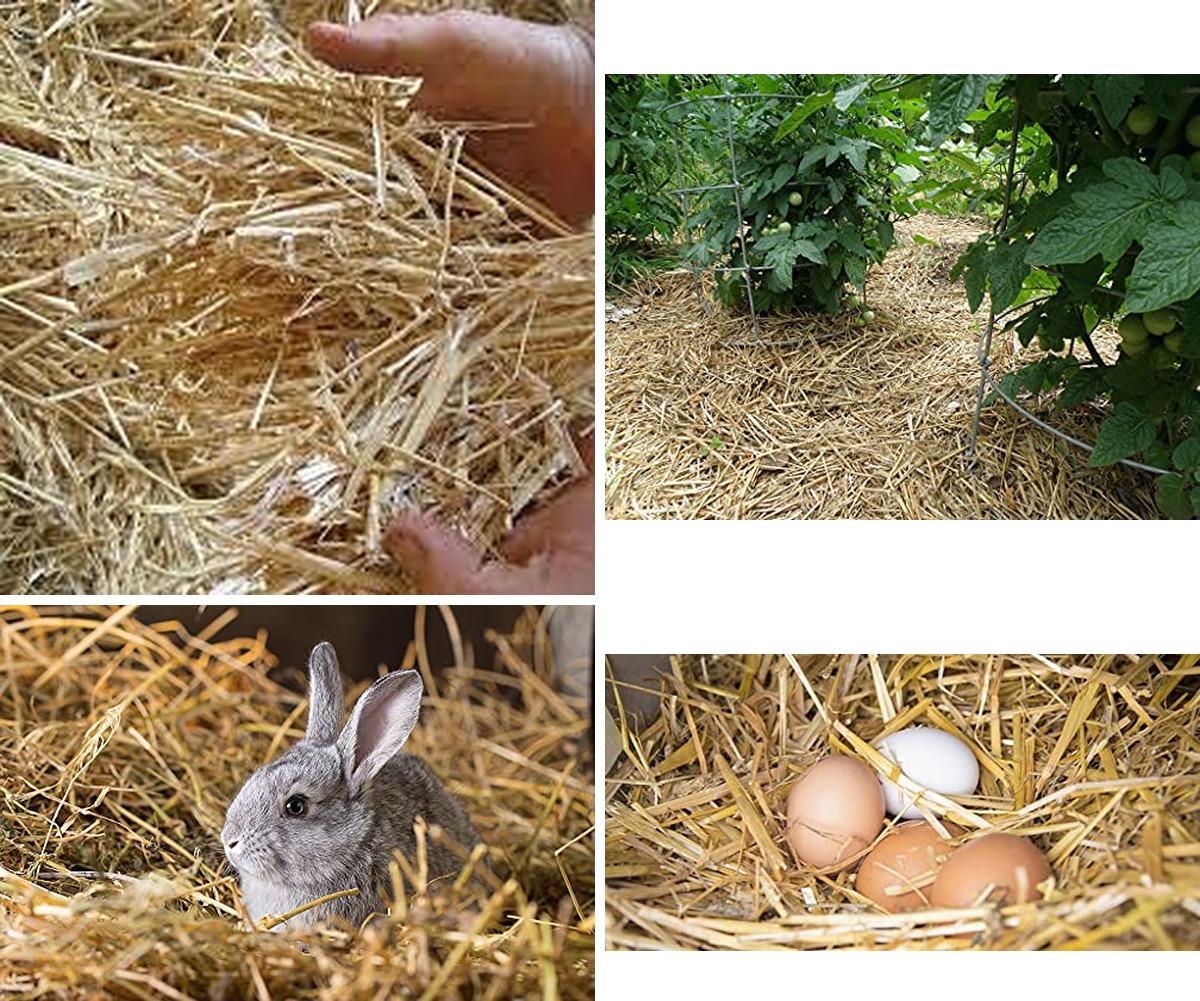As the last leaves fall and a chill creeps into the air, many of us feel a familiar pang of worry for our beloved gardens. Will our perennials survive the frost? Is the soil exposed to the harsh winter elements vulnerable to erosion? It’s a common concern for every gardener who dreams of a vibrant spring awakening.
This is precisely why the right winter garden mulch is such a game-changer. Beyond just looking tidy, applying organic mulch like compost mulch or leaf mulch before the deep freeze offers crucial insulation, protecting delicate roots and preventing soil compaction. It’s the quiet guardian of your garden beds throughout the coldest months.
Imagine waking up to healthier soil and stronger plants come spring, all thanks to a little thoughtful preparation now. Choosing the best mulch for frost protection not only saves you worry but also supports sustainable landscaping practices. We’ve gathered the best options to help you winterize your garden with confidence.
Key Takeaways
- Natural mulches like wheat straw, cocoa shells, and aspen feed and enrich soil as they decompose, promoting healthy plant growth.
- Effective mulches conserve soil moisture, reducing the need for frequent watering and creating a more drought-resilient garden.
- All-natural mulches provide excellent weed suppression, helping to maintain a tidy garden with less manual effort.
- Mulches decompose over time and require replenishment to maintain their full aesthetic and functional benefits.
- Consider landscape fabric for durable weed suppression, best used as a base layer beneath decorative mulch.
- Different mulches offer unique aesthetics, from rustic charm to serene woodland vibes, enhancing garden visual appeal.
| Image | 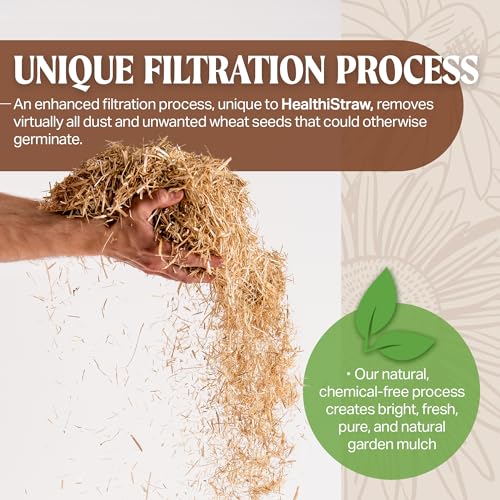 | 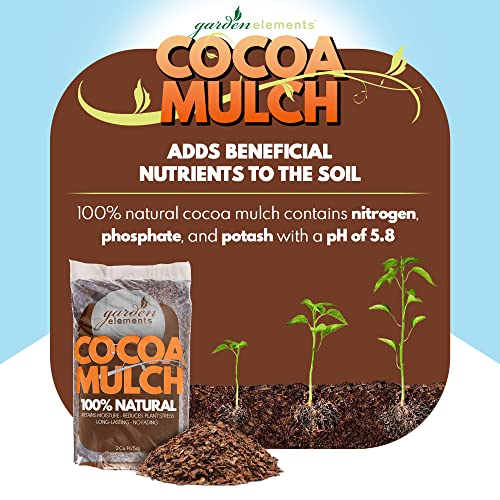 |  |
|---|---|---|---|
| Product | HealthiStraw GardenStraw, 3 cu ft (20 lbs) Pack of 1 – All-Natural Mulch for Gardens, Vegetables Lawn Seeding – Water-Conserving, Weed-Suppressing Wheat Straw – Cleaned, Sustainably Sourced HealthiStraw | Garden Elements 100% Natural Cocoa Bean Shell Mulch for Gardens, Flower Beds, Potted Plants, and Mulching, 2 cu ft Garden Elements | Brut Organic Aspen Mulch, 10 Quart, Odor-Free, Nutrient Rich, High Water Retention, for Vegetable Gardens, Houseplants, Landscaping BRUT WORM FARMS |
| Link | Check Price on Amazon | Check Price on Amazon | Check Price on Amazon |
| Material | Wheat Straw | Cocoa Bean Shell | Aspen |
| Size/Capacity | 3 cu ft (20 lbs) | 2 cu ft | 10 Quart |
| Key Features |
|
|
|
| Depth/Height | |||
| Best For | Gardens, Vegetables, Lawn Seeding | Gardens, Flower Beds, Potted Plants | Vegetable Gardens, Houseplants, Landscaping |
1. Wheat Straw Mulch Feeds Soil

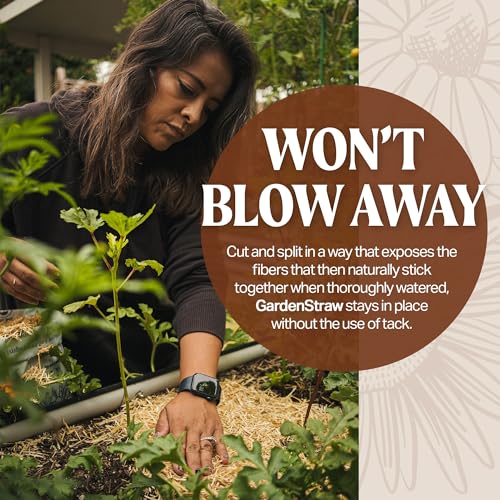
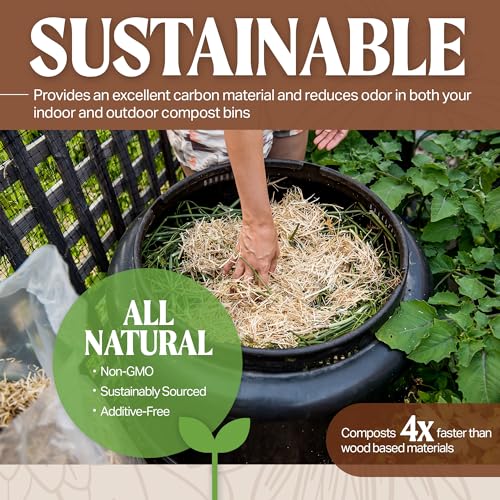
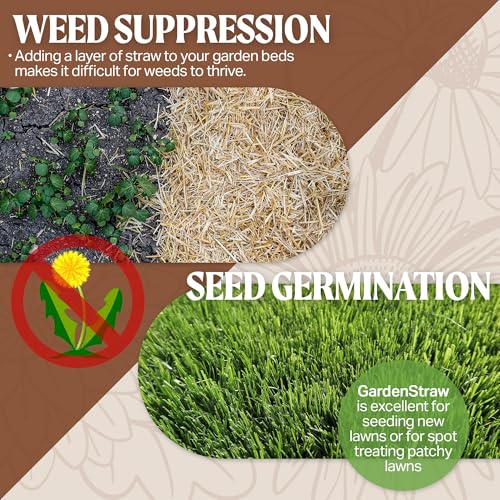
A golden blanket will soon grace your garden path, inviting the soil to breathe. This natural material offers a clean, welcoming edge that feels so soft beneath your fingertips. Consider framing your vegetable beds with this bounty, creating a warm, farmhouse-inspired aesthetic that speaks of simple abundance and nurtures a delightful sense of touch. Let its earthy tones blend seamlessly with the surrounding landscape, enhancing the visual appeal while benefiting the earth.
Embrace a lifestyle of mindful gardening where every element serves a dual purpose, enriching the soil while beautifying your outdoor sanctuary. This component acts as nature’s embrace, a gentle hand that conserves precious moisture and keeps unruly weeds at bay, allowing your plants to truly thrive. It promotes a tranquil mood, transforming your garden into a peaceful retreat where growth and beauty go hand in hand.
Pros
This garden essential is praised for its all-natural composition, acting as a beneficial mulch that actively feeds and enriches the soil as it breaks down. Its water-conserving properties are a significant advantage, reducing the need for frequent watering, while its weed-suppressing qualities help maintain a tidy appearance with less effort.
Cons
While incredibly beneficial, this product is a natural material that will decompose over time, requiring replenishment to maintain its full effect. Its light color may show dirt more readily than darker mulches, potentially needing occasional refreshing to keep its pristine appearance, especially in high-traffic areas.
Best for: Supporting healthy growth in vegetable gardens and seeding lawns.
Get more details and current pricing on Amazon.
2. Cocoa Shell Mulch for Lush Gardens



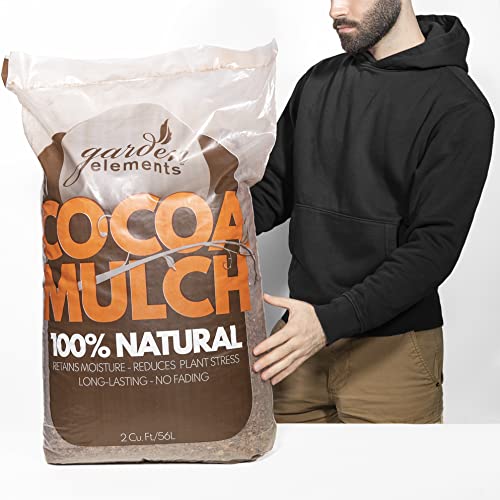
A warm chocolatey embrace will soon soften your garden paths. This natural material offers a clean, welcoming edge that feels so delightful beneath your fingertips. Frame your vegetable beds with this bounty, creating a warm, farmhouse-inspired aesthetic that speaks of simple abundance and nurtures a wonderful sense of touch.
Embrace a lifestyle of mindful gardening where every element serves a dual purpose, enriching the soil while beautifying your outdoor sanctuary. This component acts as nature’s embrace, a gentle hand that conserves precious moisture and keeps unruly weeds at bay, allowing your plants to truly thrive. It promotes a tranquil mood, transforming your garden into a peaceful retreat where growth and beauty go hand in hand.
Pros
This garden essential is praised for its all-natural composition, acting as a beneficial mulch that actively feeds and enriches the soil as it breaks down. Its water-conserving properties are a significant advantage, reducing the need for frequent watering, while its weed-suppressing qualities help maintain a tidy appearance with less effort.
Cons
While incredibly beneficial, this product is a natural material that will decompose over time, requiring replenishment to maintain its full effect. Its light color may show dirt more readily than darker mulches, potentially needing occasional refreshing to keep its pristine appearance, especially in high-traffic areas.
Best for: Supporting healthy growth in vegetable gardens and seeding lawns.
3. Aspen Mulch for Lush Gardens




A light, airy layer soon adorns your garden beds. This natural material offers a clean, welcoming edge that feels so soft to the touch. Consider framing your herb borders with this bounty, creating a tranquil, zen-inspired aesthetic that speaks of simple harmony and nurtures a delightful sense of calm.
Embrace a lifestyle of mindful gardening where every element serves a dual purpose, enriching the soil while beautifying your outdoor sanctuary. This component acts as nature’s embrace, a gentle hand that conserves precious moisture and keeps unruly weeds at bay, allowing your plants to truly thrive. It promotes a tranquil mood, transforming your garden into a peaceful retreat where growth and beauty go hand in hand.
Pros
This garden essential is praised for its all-natural composition, acting as a beneficial mulch that actively feeds and enriches the soil as it breaks down. Its water-conserving properties are a significant advantage, reducing the need for frequent watering, while its weed-suppressing qualities help maintain a tidy appearance with less effort.
Cons
While incredibly beneficial, this product is a natural material that will decompose over time, requiring replenishment to maintain its full effect. Its light color may show dirt more readily than darker mulches, potentially needing occasional refreshing to keep its pristine appearance, especially in high-traffic areas.
Best for: Supporting healthy growth in vegetable gardens and seeding lawns.
Get more details and current pricing on Amazon.
4. Eucalyptus Mulch for Fragrant Gardens




A refreshing, aromatic blanket will soon enhance your garden paths. Consider framing your sensory herb garden with this bounty, creating a tranquil, spa-like aesthetic that speaks of natural calm and nurtures a delightful sense of scent.
Embrace a lifestyle of mindful gardening where every element serves a dual purpose, enriching the soil while beautifying your outdoor sanctuary. This component acts as nature’s embrace, a gentle hand that conserves precious moisture and keeps unruly weeds at bay, allowing your plants to truly thrive. It promotes a tranquil mood, transforming your garden into a peaceful retreat where growth and beauty go hand in hand.
Pros
This garden essential is praised for its all-natural composition, acting as a beneficial mulch that actively feeds and enriches the soil as it breaks down. Its water-conserving properties are a significant advantage, reducing the need for frequent watering, while its weed-suppressing qualities help maintain a tidy appearance with less effort.
Cons
While incredibly beneficial, this product is a natural material that will decompose over time, requiring replenishment to maintain its full effect. Its light color may show dirt more readily than darker mulches, potentially needing occasional refreshing to keep its pristine appearance, especially in high-traffic areas.
Best for: Enhancing fragrant gardens and supporting healthy plant growth.
5. Pine Spruce Mulch for Gardens
A fragrant, earthy blanket will soon grace your garden path. Consider framing your winding walkways with this bounty, creating a serene, woodland-inspired aesthetic that speaks of quiet contemplation and nurtures a delightful sense of peace.
Embrace a lifestyle of mindful gardening where every element serves a dual purpose, enriching the soil while beautifying your outdoor sanctuary. This component acts as nature’s embrace, a gentle hand that conserves precious moisture and keeps unruly weeds at bay, allowing your plants to truly thrive. It promotes a tranquil mood, transforming your garden into a peaceful retreat where growth and beauty go hand in hand.
Pros
This garden essential is praised for its all-natural composition, acting as a beneficial mulch that actively feeds and enriches the soil as it breaks down. Its water-conserving properties are a significant advantage, reducing the need for frequent watering, while its weed-suppressing qualities help maintain a tidy appearance with less effort.
Cons
While incredibly beneficial, this product is a natural material that will decompose over time, requiring replenishment to maintain its full effect. Its light color may show dirt more readily than darker mulches, potentially needing occasional refreshing to keep its pristine appearance, especially in high-traffic areas.
Best for: Supporting healthy growth in woodland and shaded garden areas.
6. Poplar Bark Mulch for Gardens
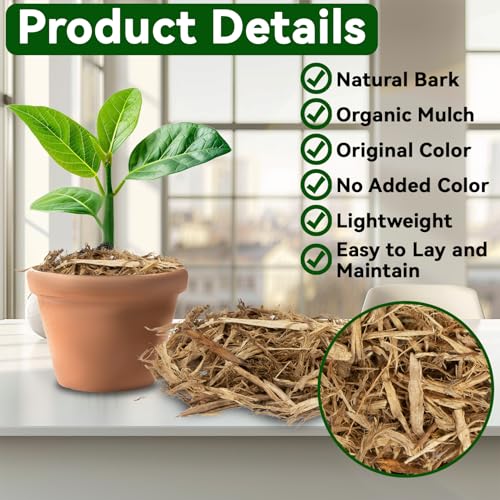
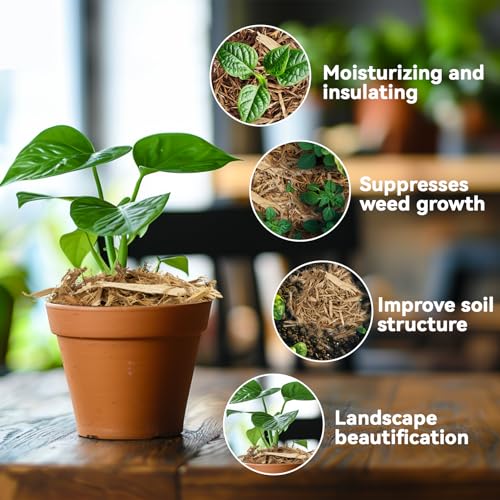
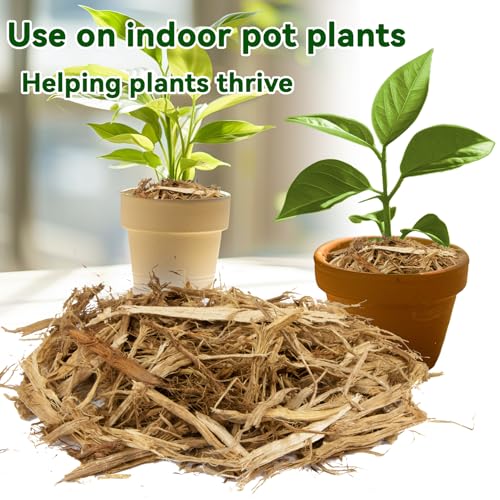
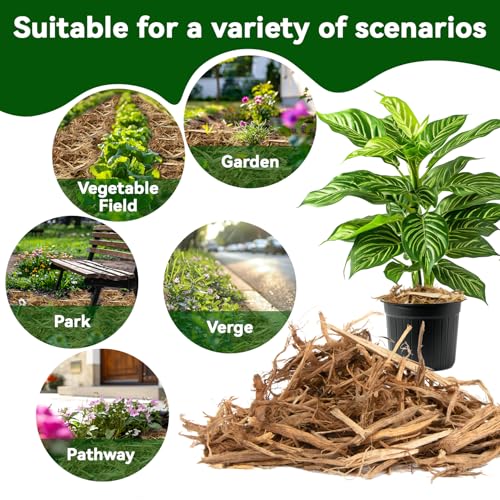
A gentle dusting of pale amber soon graces your garden beds. Consider framing your vibrant flower borders with this bounty, creating a soft, naturalistic aesthetic that speaks of understated elegance and nurtures a delightful sense of quiet beauty.
Embrace a lifestyle of thoughtful design where every element contributes to a harmonious outdoor sanctuary. This component acts as nature’s thoughtful accent, a subtle layer that enhances visual flow and encourages a tranquil mood, transforming your garden into a peaceful retreat where plant life and refined style go hand in hand.
Pros
This natural material offers a clean, welcoming appearance that complements a wide range of garden designs. Its composition helps retain soil moisture and suppresses weed growth, contributing to healthier plant life and reducing maintenance efforts.
Cons
As an organic material, this mulch will gradually decompose over time, requiring occasional replenishment to maintain its optimal aesthetic and functional benefits. Its lighter tone may show accumulated garden debris more readily than darker alternatives.
Best for: Highlighting ornamental plantings and enhancing the aesthetic of garden borders.
Get more details and current pricing on Amazon.
7. Pine Bark Nuggets Enhance Gardens
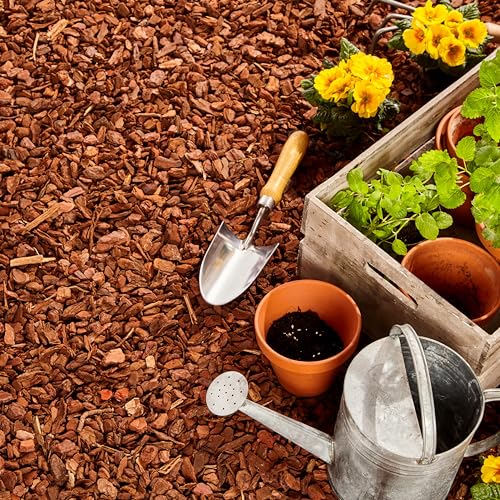
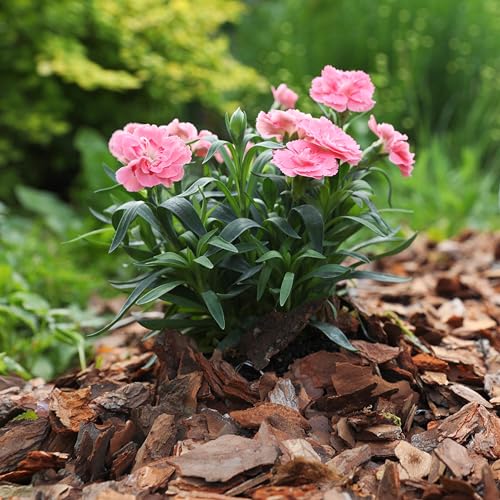


A warm, earthy blanket will soon grace your garden paths. Consider framing your winding walkways with these nuggets, creating a serene, woodland-inspired aesthetic that speaks of quiet contemplation and nurtures a delightful sense of peace.
Embrace a lifestyle of mindful gardening where every element serves a dual purpose, enriching the soil while beautifying your outdoor sanctuary. This component acts as nature’s embrace, a gentle hand that conserves precious moisture and keeps unruly weeds at bay, allowing your plants to truly thrive. It promotes a tranquil mood, transforming your garden into a peaceful retreat where growth and beauty go hand in hand.
Pros
This garden essential is praised for its all-natural composition, acting as a beneficial mulch that actively feeds and enriches the soil as it breaks down. Its water-conserving properties are a significant advantage, reducing the need for frequent watering, while its weed-suppressing qualities help maintain a tidy appearance with less effort.
Cons
While incredibly beneficial, this product is a natural material that will decompose over time, requiring replenishment to maintain its full effect. Its light color may show dirt more readily than darker mulches, potentially needing occasional refreshing to keep its pristine appearance, especially in high-traffic areas.
Best for: Supporting healthy growth in woodland and shaded garden areas.
Get more details and current pricing on Amazon.
8. Woven Weed Barrier Landscape Fabric
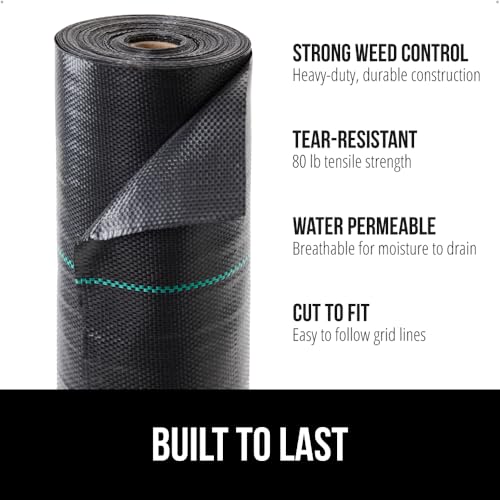
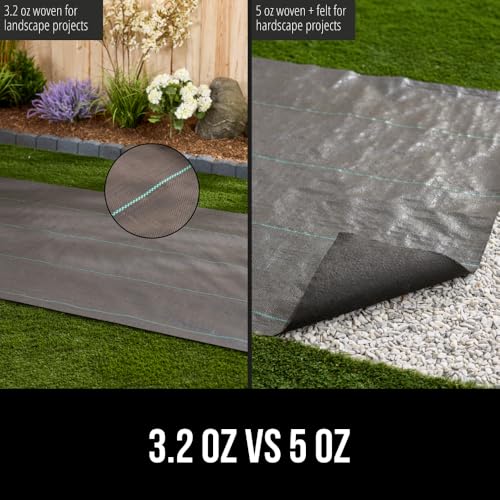
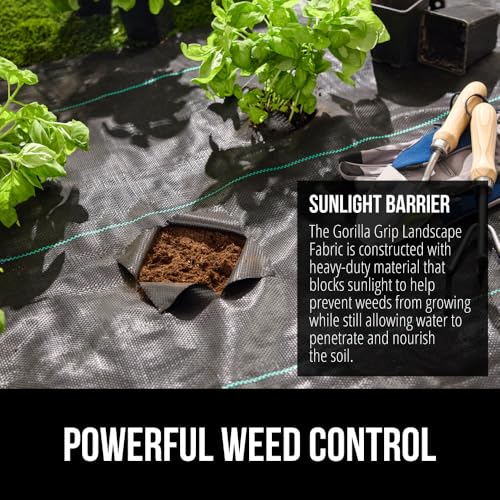
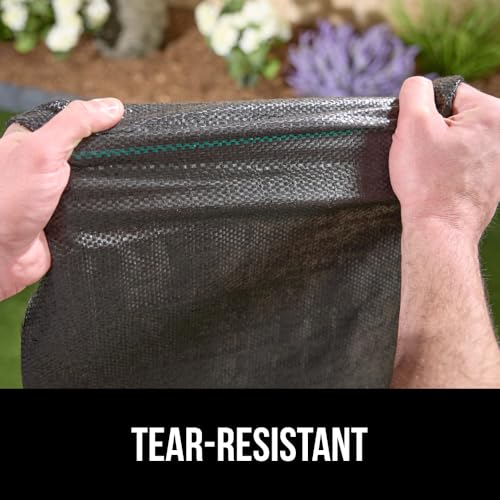
A sturdy, foundational layer creates a clean canvas for your garden beds. Consider framing your raised vegetable planters with this robust material, establishing a neat, practical aesthetic that speaks of diligent care and nurtures a sense of order.
Embrace a lifestyle of thoughtful planning where every element serves a dual purpose, supporting growth while ensuring a refined outdoor sanctuary. This piece acts as nature’s reliable shield, a strong barrier that conserves precious moisture and keeps unruly weeds at bay, allowing your plants to truly thrive. It promotes a focused mood, transforming your garden into an efficient space where dedicated cultivation and subtle beauty go hand in hand.
Pros
This essential is praised for its exceptional durability and tear-resistant qualities, offering reliable long-term weed suppression. Its permeable nature allows water and air to reach the soil, promoting healthy plant growth while conserving moisture and reducing the need for frequent watering.
Cons
While highly effective, this is a utilitarian fabric designed for function, and its appearance may be best concealed by a decorative top layer of mulch or gravel. Its strong barrier may also inhibit the natural spread of beneficial ground cover plants.
Best for: Establishing weed-free zones in garden beds and under pathways.
Get more details and current pricing on Amazon.
9. Cedar Mulch Beautifies Your Garden
A warm, inviting blanket will soon grace your garden paths. Consider framing your winding walkways with this bounty, creating a serene, woodland-inspired aesthetic that speaks of quiet contemplation and nurtures a delightful sense of peace.
Embrace a lifestyle of mindful gardening where every element serves a dual purpose, enriching the soil while beautifying your outdoor sanctuary. This component acts as nature’s embrace, a gentle hand that conserves precious moisture and keeps unruly weeds at bay, allowing your plants to truly thrive. It promotes a tranquil mood, transforming your garden into a peaceful retreat where growth and beauty go hand in hand.
Pros
This garden essential is praised for its all-natural composition, acting as a beneficial mulch that actively feeds and enriches the soil as it breaks down. Its water-conserving properties are a significant advantage, reducing the need for frequent watering, while its weed-suppressing qualities help maintain a tidy appearance with less effort.
Cons
While incredibly beneficial, this product is a natural material that will decompose over time, requiring replenishment to maintain its full effect. Its light color may show dirt more readily than darker mulches, potentially needing occasional refreshing to keep its pristine appearance, especially in high-traffic areas.
Best for: Supporting healthy growth in woodland and shaded garden areas.
10. Organic Straw Mulch for Gardens
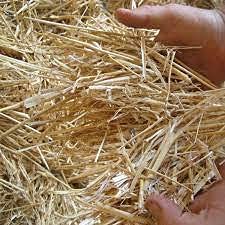
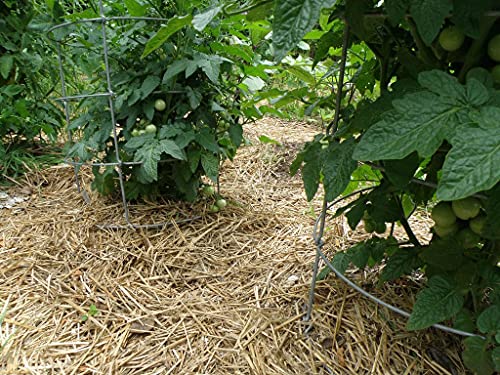
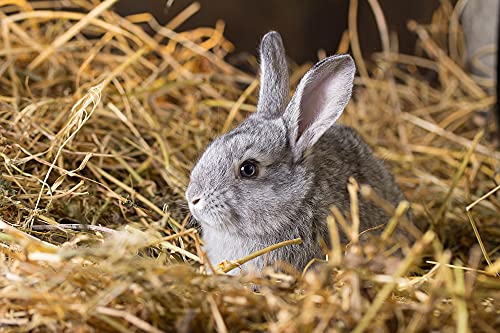
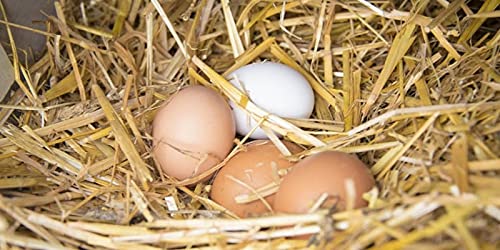
A sun-kissed blanket will soon adorn your garden paths. Consider framing your rambling rose beds with this bounty, creating a charming, cottage-inspired aesthetic that speaks of bucolic ease and nurtures a delightful sense of rustic beauty.
Embrace a lifestyle of relaxed charm where every element contributes to a welcoming outdoor sanctuary. This piece acts as nature’s soft embrace, a gentle layer that conserves precious moisture and keeps unruly weeds at bay, allowing your plants to truly flourish. It promotes a tranquil mood, transforming your garden into a peaceful retreat where growth and natural beauty go hand in hand.
Pros
This garden essential is praised for its all-natural composition, acting as a beneficial mulch that actively feeds and enriches the soil as it breaks down. Its water-conserving properties are a significant advantage, reducing the need for frequent watering, while its weed-suppressing qualities help maintain a tidy appearance with less effort.
Cons
As an organic material, this straw will decompose over time, requiring replenishment to maintain its full effect. Its light color may show dirt more readily than darker mulches, potentially needing occasional refreshing to keep its pristine appearance, especially in high-traffic areas.
Best for: Supporting healthy growth in vegetable gardens and enhancing the look of flower borders.
Get more details and current pricing on Amazon.
This post contains affiliate links. Purchases may earn me a commission at no extra cost to you.
FAQs
Q: What are the best mulches to insulate soil in winter for gardens?
The best mulches for winter insulation include wood chips, shredded bark, straw, pine needles, and compost. These materials create a protective barrier that helps regulate soil temperature.
Q: How deep should I apply winter mulch?
For effective winter insulation, apply 2 to 4 inches of mulch. This depth is sufficient to protect plant roots from extreme temperature fluctuations.
Q: Can I use any type of mulch to insulate soil in winter?
While most organic mulches work, avoid fine-textured mulches like sawdust in large quantities, as they can compact and impede airflow. Coarser materials like wood chips are generally better for winter soil insulation.
Q: When should I apply mulch for winter soil insulation?
Apply mulch for winter insulation after the ground has begun to cool but before it freezes solid, typically in late fall. This timing allows the soil to retain some warmth before being covered.
Q: How does mulch insulate soil in winter?
Mulch insulates soil in winter by trapping air, which acts as an insulator. It also moderates soil temperature by buffering against rapid drops and preventing frost heave.
Q: Are there any mulches to avoid for winter soil insulation?
Avoid using fresh grass clippings or very fine materials that can mat down and become waterlogged, potentially leading to fungal issues. Large, bulky mulches like straw or wood chips are generally preferred for winter.
Top 10 Winter Garden Mulches
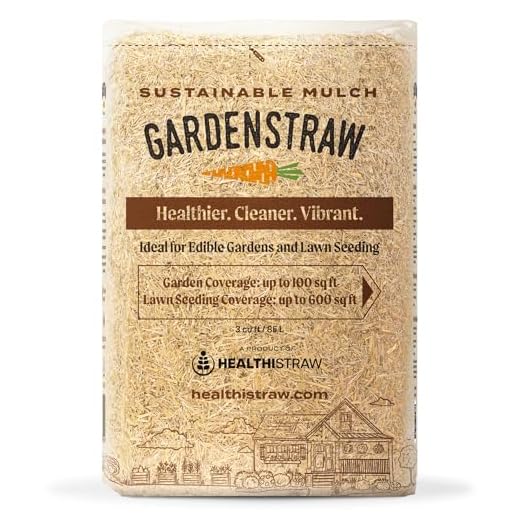


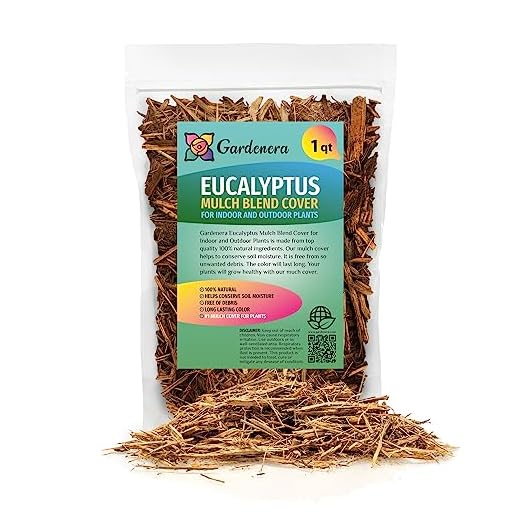
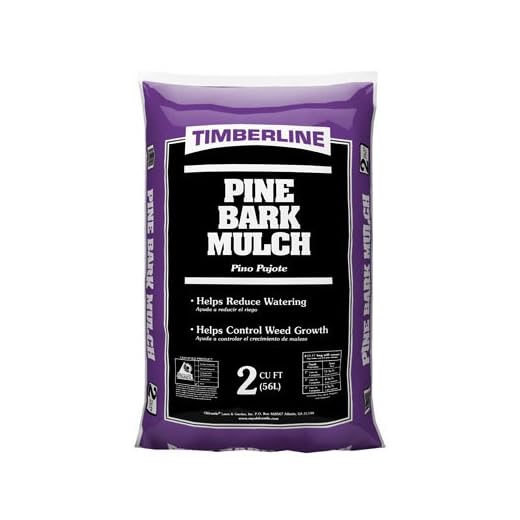
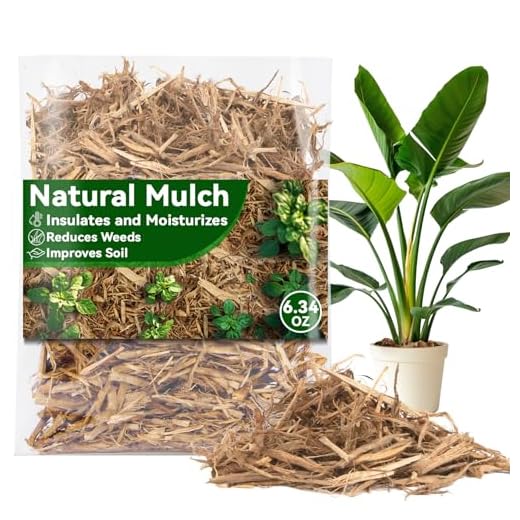

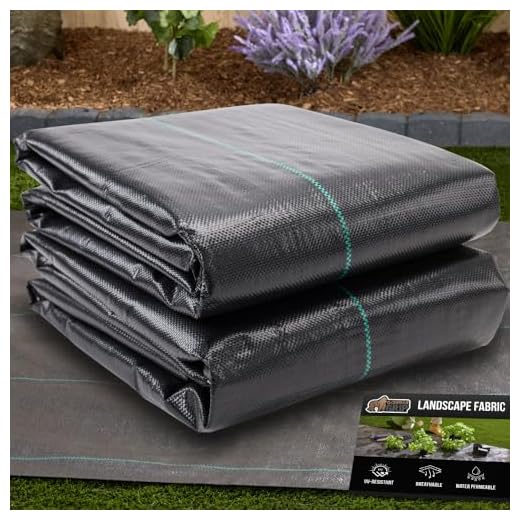


Conclusion
Utilizing natural mulches like wheat straw, cocoa shells, aspen, pine, cedar, or organic straw offers significant benefits for garden health, including moisture conservation and weed suppression. While these organic materials enrich the soil as they decompose, they require periodic replenishment. For a more permanent solution, woven weed barrier fabric provides long-term weed control but may require a decorative top layer. Choose mulches for soil enrichment and aesthetic appeal; select landscape fabric for durable weed suppression.
Recommended Products
- Wheat Straw Mulch – This natural mulch actively feeds soil and conserves moisture, ideal for vegetable gardens and seeding lawns.
- Woven Weed Barrier Landscape Fabric – Offers durable, tear-resistant weed suppression while allowing water and air penetration for healthy plant growth.
- Pine Bark Nuggets – Provides a serene, woodland aesthetic and functions as beneficial mulch that conserves water and suppresses weeds.

With over 15 years of hands-on experience in controlled-environment agriculture, Angelina leads our lab audits. Her focus is on bridging the gap between high-end agricultural tech and the home grower, ensuring every recommendation is backed by real-world data and yield performance.

